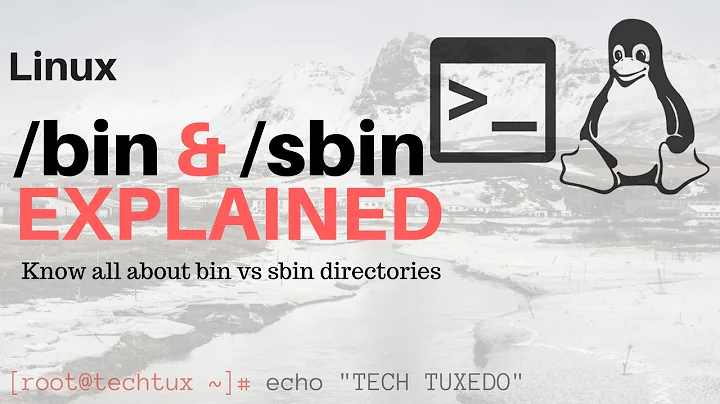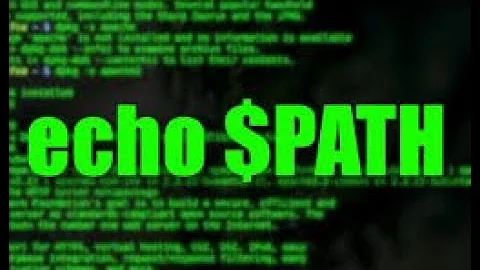Add /usr/local/sbin to the PATH of a user
126,354
Solution 1
The easiest way is to add this line to your user's ~/.bashrc file:
export PATH=$PATH:/usr/local/sbin
Bear in mind that /sbin/, /usr/sbin and /usr/local/sbin are not in normal users' $PATHs by default because these directories tend to contain "dangerous" executables. Things like fdisk or deluser that need administrative privileges and can harm your computer. They should be in root's path by default and you need to be root to run them anyway, so it migh be a good idea not to add them to a normal user's $PATH.
Solution 2
Add the following to the end of the .bashrc of the user:
export PATH=/usr/local/sbin:$PATH
Related videos on Youtube
Author by
rubo77
Updated on September 18, 2022Comments
-
rubo77 over 1 year
if I type
echo $PATHI only get
/usr/local/bin:/usr/bin:/bin:/usr/local/games:/usr/games
how can I add
/usr/local/sbinto the path, so it is already there the next time?(I use debian squeeze)
-
 Admin almost 4 yearsSee here: apple.stackexchange.com/a/310817/198133
Admin almost 4 yearsSee here: apple.stackexchange.com/a/310817/198133
-
-
vgoff almost 11 yearsAssuming they are using bash.
-
 terdon almost 11 years@vgoff the question is tagged with bash.
terdon almost 11 years@vgoff the question is tagged with bash. -
vgoff almost 11 yearsYes, it is. Didn't notice initially. Left it after I hit 'add comment'
-
rubo77 almost 11 yearsWouldnt that add the path to $PATH again and again? And which would be the correct path to store own written bash files then? files, that the user may execute?
-
 slhck almost 11 years@rubo77 The PATH is only set for a shell session, and
slhck almost 11 years@rubo77 The PATH is only set for a shell session, and.bashrcis only called once at the start of the session. Your own scripts, you could store them in~/bin, and add that to the path, for example. -
 terdon almost 11 years@rubo77 No,
terdon almost 11 years@rubo77 No,PATH=$PATH:/fooappends/footo the current value of$PATH.PATH=/foo:$PATHprepends/footo the current value of$PATH. As for where you place your own scripts, the most common is~/binbut you can use whatever you like as long as you add it to your $PATH as described. Personally I use~/scripts. -
rubo77 almost 11 yearsOK. but isn't there a convention where to store text-bash files that all users may execute? I created a new question about that: superuser.com/questions/595828/…
-
vgoff almost 11 years@rubo77 you may be thinking of
/usr/local/binas/usr/binis generally used by the 'OS vendor'. This means that if you do updates, and your script happens to have a name of some new inclusion, it will be over-written. -
 drevicko over 7 yearsDo you recommend adding to the start (as in @criziot's answer) or end of the path (as in your answer)? Why?
drevicko over 7 yearsDo you recommend adding to the start (as in @criziot's answer) or end of the path (as in your answer)? Why? -
 terdon over 7 years@drevicko if you add the new dir to the beginning, executables in it will take precedence. If you have two executables named
terdon over 7 years@drevicko if you add the new dir to the beginning, executables in it will take precedence. If you have two executables namedfoo, the one that was found first, so the one in the directory of your PATH that comes first, will be executed when you runfoo. So it's up to you. If you want the new dir to take precedence, add it to the beginning, otherwise, add it to the end. -
 drevicko over 7 years@terdon doesn't really answer my question, but sbin is intended for executables that require admin preveliges and bin for those for everyone, so you'd not expect the same executable in both. That means it's probably not an issue which is first. It's usually safer to put things at the end of the path though, unless you've a good reason not to.
drevicko over 7 years@terdon doesn't really answer my question, but sbin is intended for executables that require admin preveliges and bin for those for everyone, so you'd not expect the same executable in both. That means it's probably not an issue which is first. It's usually safer to put things at the end of the path though, unless you've a good reason not to. -
 terdon over 7 years@drevicko no, the only difference is precedence. For example, I like having the directory holding my own programs first, since I sometimes write wrapper scripts to replace the standard tools.
terdon over 7 years@drevicko no, the only difference is precedence. For example, I like having the directory holding my own programs first, since I sometimes write wrapper scripts to replace the standard tools. -
 drevicko over 7 years@terdon yes, but a less experienced user can get into trouble with that - if some program they run from the terminal expects certain behaviours from standard tools which are different in the folder added to the front of PATH, they may break. An example is running anaconda python (which adds itself to the front of PATH) and then using
drevicko over 7 years@terdon yes, but a less experienced user can get into trouble with that - if some program they run from the terminal expects certain behaviours from standard tools which are different in the folder added to the front of PATH, they may break. An example is running anaconda python (which adds itself to the front of PATH) and then usingbrewon a mac. Other examples can come from version conflicts in standard tools.




